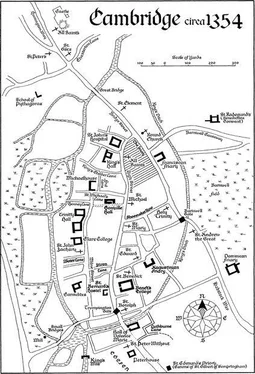Michael seemed unconcerned by the prospect of attack, and was more interested in outlining the duties of Junior Proctor to Timothy. Timothy himself was more prudent, and carried a heavy staff that Bartholomew was sure was not a walking aid. Janius was also alert, and Bartholomew could see that he possessed the kind of wiry strength that was easily able to best larger men. While Michael continued to regale Timothy with details of his new obligations, Janius fell behind to walk with the physician.
‘I am still worried about Adam,’ he said, fiddling with the cover on his basket of food for the lepers. ‘He claims he feels better, and our prayers help, of course, but sometimes he seems so frail.’
‘He is old,’ said Bartholomew matter-of-factly. ‘I can ease his symptoms, but he will never be well again.’
Janius gave a startled laugh. ‘You do not mince your words, Matthew! I was expecting some comfort, not a bleak prediction. Have you no faith that God will work a cure if we pray hard enough?’
‘No,’ said Bartholomew practically. ‘Adam is almost eighty years old, and the wetness in his lungs will become progressively worse, not better. Such ailments are common in men of his age, and there is only one way it will end.’
Janius shook his head and gave Bartholomew a pitying glance. ‘Yours must be a very sad existence if you place no hope in miracles.’
‘My experience tells me that miracles are rare. It is better to assume that they will not happen.’
‘You should pray with us at Ely Hall,’ said Janius, patting Bartholomew’s arm sympathetically. ‘You strike me as a man who needs to understand God.’
‘Right,’ said Bartholomew vaguely, determined not to engage in a theological debate with a man whose eyes were already gleaming with the fervour of one who senses a challenge worthy of his religious attentions. He knew from personal experience that it was never wise to discuss issues relating to the omnipotence of God with men who had the power to denounce unbelievers as heretics, and he hastily changed the subject before the discussion became dangerous. ‘Do you often deliver eggs to the leper colony?’
Janius seemed taken aback by the sudden change in topics. He tapped Bartholomew’s arm a little harder. ‘Remember my offer, Matthew. It may save your soul from the fires of Hell.’
Bartholomew was relieved when Janius made his farewells, and watched the pious monk walk briskly up the footpath to where the chapel of St Mary Magdalene dominated the huddle of hovels occupied by the lepers. The chapel was a sturdy building, pierced by narrow windows, almost as if its builders did not want the light to shine in on the people inside. The huts were flimsy wooden-framed affairs, with thatched roofs that allowed the smoke from a central hearth to seep out and the rain to seep in. Bartholomew had visited them on many occasions, usually to help Urban, the Austin canon who had dedicated his life to tending those people whom the rest of society had cast out. He saw Janius turn a corner, then ran to catch up with Timothy and Michael.
‘Janius has a good heart,’ said Timothy, who must have had half an ear on the conversation taking place behind him, as well as on Michael’s descriptions of his new duties. ‘His own faith is so strong that he longs for others to be similarly touched. I understand how he feels, although I am less eloquent about it.’
‘Good,’ said Michael fervently. ‘I already wear the cowl, so you have no need to preach to me.’
‘Just because you are a monk does not mean that your faith is not flawed,’ began Timothy immediately, his face serious and intense. ‘I have met many clerics who simply use their habits to advance their own interests here on Earth, with no thoughts of the hereafter.’
‘And doubtless you will meet many more,’ said Michael brusquely. Given what he had told Bartholomew about the reasons most friars came to Cambridge, the physician supposed that Timothy was likely to meet a lot of men who were more interested in the earthly than the spiritual aspects of their existence. ‘But we have arrived. Here is the priory.’
Barnwell Priory was a large institution, and the fact that it stood in the middle of nowhere meant that it had been able to expand as and when its priors had so dictated. Its rambling collection of buildings sprawled along the ridge of a low rise that overlooked the river. It was in a perfect location – close enough to the river for supplies and transport, but high enough to avoid all but the worst of the seasonal floods. A substantial wall and a series of wooden fences protected it from unwanted visitors, although beggars knocking at a small door near the kitchens were often provided with a loaf of bread or a few leftover vegetables.
The conventual church stood next to the road, attached to the chapter house by a cloister of stone. To one side was a two-storeyed house, which comprised the canons’ refectory on the ground floor and their sleeping quarters above. The Prior of Barnwell had his own lodgings in the form of a charming cottage with a red-tiled roof and ivy-clad walls. Smoke curled from its chimney, to be whisked away quickly by the wind. From the nearby kitchens came the sweet, warm scent of newly baked bread.
The canons were at prayer in their chapter house when Bartholomew, Michael and Timothy tapped on the gate and asked to see Walcote’s body. An Austin brother named Nicholas, whom Bartholomew had treated for chilblains all winter, escorted them to a small chantry chapel. He then returned to his duties, while the two canons who kept vigil on either side of Walcote’s coffin, climbed stiffly to their feet, and readily acquiesced to Michael’s request to spend time alone with his Junior Proctor.
The noose around Walcote’s neck had so distorted his features that Bartholomew barely recognised the serious man who had been Michael’s assistant for the past year. His face had darkened, and his eyes were half open and dull beneath swollen lids. A tongue poked between thickened lips, and a trail of dried saliva glistened on his chin. Michael declined to look at him, and retreated to the main body of the church where he pretended to be praying. Hastily following his example, and evidently relieved to be spared the unpleasant task of inspecting a corpse, Timothy went with him.
Suppressing his distaste at submitting to such indignities the body of a man he had known and liked in life, Bartholomew began his examination, using for light the two candles that had been set at the dead man’s head and feet. There was no question at all that Walcote had been strangled. The vivid abrasions around his neck attested to that. Bartholomew turned his attention to the hands, and saw that Michael had been right: more stark circles indicated that Walcote’s hands had been tied, and he had evidently struggled hard, because he had torn the skin in his attempts to free himself. His feet had been tied, too, perhaps to prevent him from kicking out at his killer or killers.
‘What can you tell me?’ called Michael from the shadows of the chancel. ‘Look at his fingernails. You always seem to be able to tell things from nails. And I want to know whether he was hit on the head and stunned. It would be a comfort to know that he was unaware of what happened to him.’
It was a comfort Bartholomew could not give, however, and it was apparent that Walcote had known exactly what someone intended to do to him, because he had struggled. The fact that he had been strangled by the noose, and that it had not broken his neck as was the case in many hangings, suggested it had not been an especially speedy end.
To humour Michael, Bartholomew inspected Walcote’s fingernails, but they told him little. They were broken, which implied that the Junior Proctor had started his bid for freedom before he had been trussed up like a Yuletide chicken. The only odd thing was that there was a sticky, pale yellow residue on one hand, just like the stain Bartholomew had seen on Faricius’s hand. He frowned, wondering what, if anything, it meant. He replaced the shroud, put the dead man’s hands back across his chest as he had found them, and left Walcote in peace. Michael and Timothy followed him out of the shadowy chapel, both clearly glad to be away from the unsettling presence of untimely death in a man they had known. Timothy heaved a shuddering sigh.
Читать дальше












